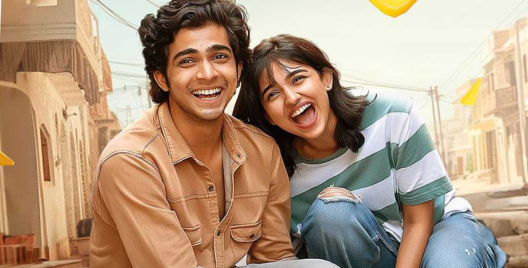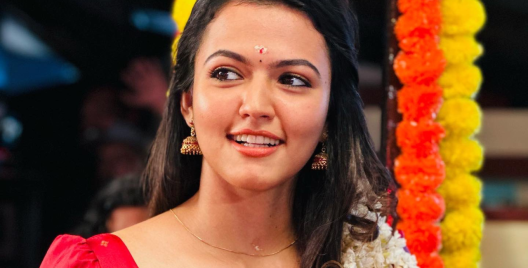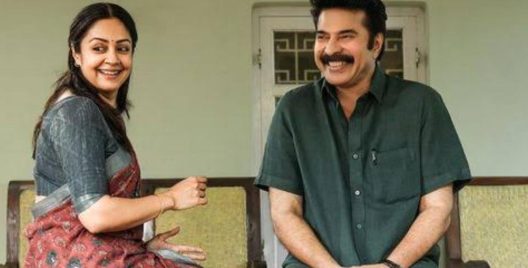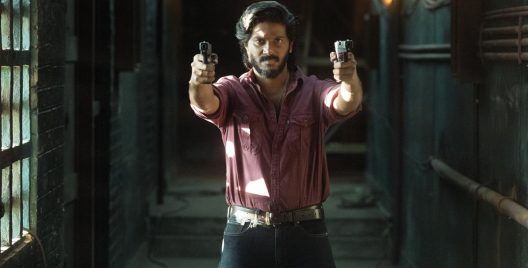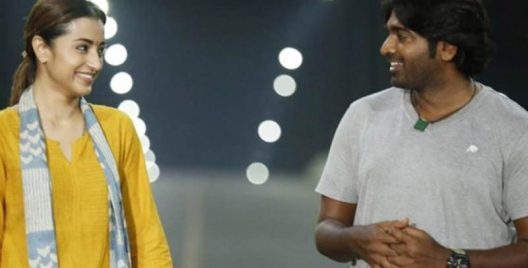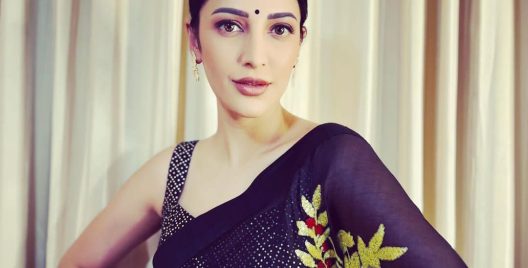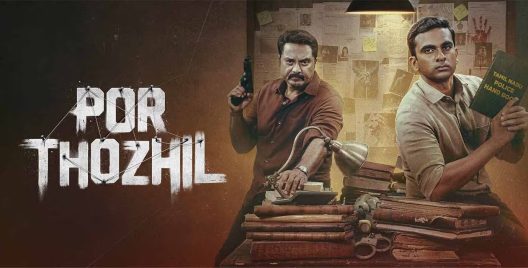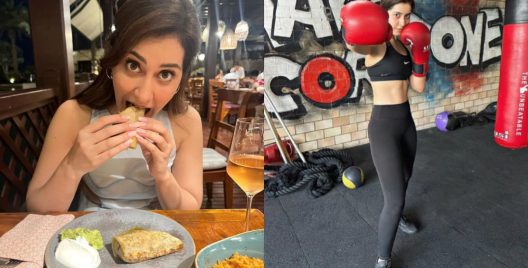Director: Karthik Subbaraj
Karthik Subbaraj has been establishing a series of Gangster movies. As soon as Mahaan begins, we worry if this movie too will become one such Gangster related story. However, Karthik saves us from yet another predictable movie, by giving a movie of ironies and duality. Taken on the lines of principles and beliefs, Mahaan is surely a different concept, with quite a few hypocrisies.
The movie starts and ends with one quote, “Freedom is not worth having if it does not include the freedom to make mistakes,” by Mahatma Gandhi. If put in simple terms, the entire movie revolves around this idea, the idea of who’s wrong and who’s right. It starts by showing Gandhi Mahaan (Vikram) inheriting the legacy of being a believer of Gandhian principles, and how he has carried it for 40 years, until he just can’t anymore, one fine day. He then enjoys one day, living against every principle he believed in for 40 years, and this day changes his entire life. What he becomes, and how the sins of his past attack him, forms the rest of the story.

Now, the movie has solely focused on 2 words, “Gandhi” and “Sarakku” (liquor). As Vikram’s name itself is Gandhi Mahaan in the film, the name of the leader is chanted every other minute in the film, maybe to strongly establish that the movie is all things Gandhi. On the other hand, Liquor is the other subject that is deeply focused in the movie. Either it is the Liquor ban movement, or about how 2 men become successful liquor barons just because people are addicted to liquor. But, the problem here is that Mahatma Gandhi lived for much more than just ‘Liquor Ban’. He lived for peace and non-violence also. The movie’s first hypocrisy lands here, where Mahatma Gandhi’s non-violence is not even considered.
For example, Dadabhai ‘Dada’ Naoroji (Dhruv Vikram), who plays Vikram’s son in the movie, purely believes in Gandhian principles, but still chooses violence as his path to seek ‘revenge’. Now, the same Mahatma Gandhi said, “To the one who strikes you on the cheek, turn the other cheek.” Naachi (Simran), who played Gandhi Mahaan’s wife and Dada’s mother, leaves him because he lost his Gandhian principles for a day. If she was a real believer of Mahatma Gandhi and wanted to bring her son up the same way, then she would never have even taught her son to take up violence in the first place.
While these concepts could have been better thought of, maybe the director wanted to establish the hypocrisy that just as much as fingers were pointed at Gandhi Mahaan, even Dada did not stand for his Gandhian philosophies. As Gandhi Mahaan says in the end, both Gandhi and Dada are extremists for their thoughts and actions.

The 2 hours 42 minutes movie surely has a good flow, but gets tiresome as we just keep asking, “What else is left in the movie?” Surely, Subbaraj gives answers to that by building the story more and more, but it surely could have been cut short, as the longevity just makes the watcher tired after a point.
Now the most commendable aspect of the movie is it’s visual imagery. While the movie’s first half has a lot of references to Tarantino’s style of moviemaking, there are some scenes with beautiful visualisation that spills the beans even before the scene actually takes place. For example, there’s a poster of the film where Vikram is seen with 10 black hands and a pair of horns, on a bike. Now, in the film, the visual representation tries to make us think that he is ‘evil’ because the colour black is associated with ‘evil’, in any typical good vs evil fight. The opposite of black for evil is white for good. So we’re quite surprised when Dhruv Vikram is shown with the same ten hands and horns, but with a red colour instead of a white. With that simple imagery, Karthik establishes that neither Gandhi Mahaan nor Dada is the hero or villain of the film, but rather the heroes of their own ideologies. In addition, the red of Dada may be associated with the anger and revenge that he wants to seek, that is boiling inside him.

There is another place in the film, where just costumes and background shows the change of a character’s ideas. When Sathyavan (Bobby Simha) realises that he got a last warning from God, and he better mend his ways, he’s seen adorning the Mahatma Gandhi glasses and a typical formal costume. On the other hand, Gandhi Mahaan, who completely lets go off his beliefs, jumps to coloured and rich clothing, as he becomes richer and richer. This kind of importance to costume is given in quite a few places.
The characters of Mahaan are deep, and without doubt the characters have worked because of the actors who played the respective characters. Every single actor has just aced their performance in the film. The characters have so much grey area, that not once can we call one black or the other white. The best part about casting is the idea of making Dhruv Vikram play Vikram’s son in the movie too. The kind of cynical and psychotic behaviour, and the revengeful relationship he has with his father is even more buyable, because of the resemblance in body language and looks, that the two have.
The full potential of Dhruv Vikram is tapped in this movie, as Adithya Varma, his first, did not give him that much scope. Of course, Bobby Simha as Sathyavan and Sanath as Rocky, are just wonderful with their performances too. The way Bobby Simha fits into the sleeve of Sathyavan is just mesmerising, and it just proves that he is that good of an actor. Another actor, who should have gotten the same importance as the other leads, is Simran. Again, undoubtedly Simran just ruled the small time she came on screen as Naachi. But, it was pretty sad that she occupied a very small space even in the film’s poster.

That reminds us that like many Tamil films, this one too has a constant teasing of the typical ‘woman’ or ‘wife’ character. For example, a young Rocky asks his father, “Pondatti na bayandhe aaganuma?”, for which Sathyavan says, “Pondatti na bayandhu dhaan aaganum.” This just sets an age old stereotype that wives are not to be messed with. But in the movie itself, Gandhi Mahaan stops Sathyavan from slapping Naachi, just to slap Naachi himself. Maybe, more than the fact that Gandhi Mahaan lost his scruples, Naachi left him because of that slap. This aspect of the film is not explored, because Naachi’s character itself is just that of a catalyst in the film, and nothing more.
Throughout the movie we have references to the branding of women. In one scene, Gandhi Mahaan calls Rocky a ‘pondatti daasan’ in a very teasing and belittling manner. Even in the climax, Naachi is used as a bait to instigate Dada against the villain, where Gandhi Mahaan ends up branding Naachi with the words, “Avalaam oru pombalaya?” This is not new to Tamil Cinema, but without doubt, this needs to change.

On the whole, Mahaan is some kind of rags to riches story, with references to Breaking Bad, and many other Hollywood films. It follows the journey of ‘Addiction’, because the highlighted dialogue of the film is both Gandhi Mahaan and Dada saying ‘Pathala’ (not enough). It journeys through the fact that although liquor should be the subject of addiction, ironically many other things like revenge, anger, violence and money can also become matters of addictions. Mahaan is a good commercial watch, given that you are willing to let go of the fact that it has ideological conflict and not much emotional depth!




